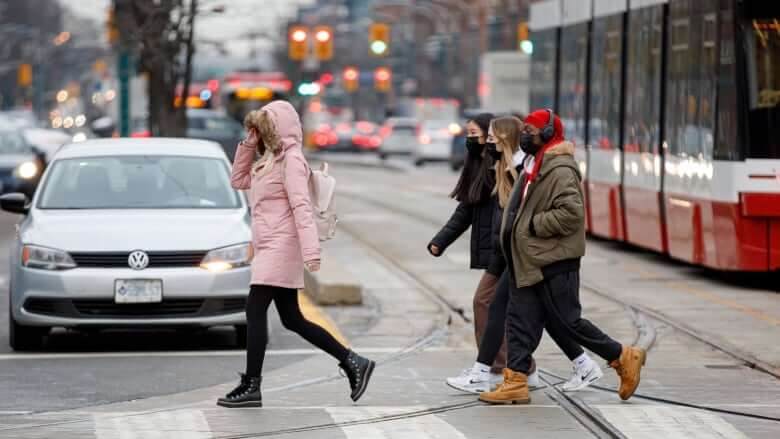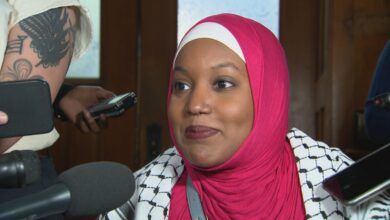Coronavirus: What’s happening in Canada

Canada’s two most-populous provinces each shattered their previous COVID-19 case counts on Thursday, with Ontario reporting 5,790 new cases and Quebec reporting a whopping 9,397 new cases.
Ontario’s case count eclipsed the previous high of 4,812, set back in mid-April, while Quebec’s previous high of 6,361 was yesterday.
Dr. Kieran Moore, Ontario’s chief medical officer of health, said this week that record-high daily case counts were expected and will likely continue for several weeks.
In Montreal, officials confirmed that one of every five Montrealers getting tested for COVID-19 is positive — and the latest data confirms that 90 per cent of infections in the city involve the Omicron variant of the novel coronavirus.
Dr. Mylene Drouin of Montreal public health says 60 per cent of the positive cases in the city are among people between the ages of 18 and 44, noting that contact tracers cannot keep up with the crush of new infections.
Several studies (see the “latest science” section below) suggest the Omicron variant is milder than the Delta version. But researchers say that good news may be overshadowed by the fact that Omicron spreads much faster than Delta and is better at evading vaccines.
As a result, the sheer number of infections linked to Omicron could still overwhelm hospitals.
What’s happening elsewhere in Canada
Prince Edward Island announced new restrictions and a record 35 new cases. Starting Friday at 8 a.m., wedding and funeral receptions as well as wakes and visitations will no longer be permitted. Organized gatherings such as worship services, wedding and funeral ceremonies, concerts and shows will be capped at 50 people, and schools won’t return to in-person learning until at least Jan. 10. The province has 165 active cases, more than the total number of cases it had during the entire first year of the pandemic.
Newfoundland and Labrador is back in COVID-19 Alert Level 3 as of this morning, the change brought on by a rapid increase in cases, the emergence of the Omicron variant and outbreaks found across three of the province’s regional health authorities. At Level 3, people are asked to stay home as much as possible and to maintain a household bubble of up to 20 people.
New Brunswick and Nova Scotia both recorded a record high number of daily cases on Wednesday, 237 and 537, respectively.
On Prince Edward Island, Health P.E.I. says the province could soon be changing rules on when health-care workers have to self-isolate. CEO Dr. Michael Gardam said making staff who have been close contacts self-quarantine until they receive negative results could soon become unsustainable if COVID-19 cases continue to ramp up.
Manitoba reported 400 new cases Wednesday, as the province announced plans to delay the return to school after the holidays until Jan. 10. The province also plans to distribute KN95 respirator masks at Winnipeg liquor outlets and casinos, beginning today, and across the province after Christmas.
In Saskatchewan, there were 105 new cases reported on Wednesday. The province’s Opposition and a health analyst are both questioning the province’s lack of response to a potential Omicron surge. Chief Medical Health Officer Dr. Saqib Shahab released new modelling Tuesday predicting that without additional health measures the province’s daily case count will surpass 300 in one month. Opposition NDP Leader Ryan Meili said “there is a shocking disconnect” between what the modelling is showing and the government not implementing additional measures. “It makes zero sense.”
Health officials in Alberta reported 1,346 new cases Wednesday. Confirmed cases of the Omicron variant grew to 2,131 on Wednesday, up from 1,609 in Tuesday’s update. The province is reducing allowable gathering numbers as of Christmas Eve. Restaurants, pubs and bars will have a maximum table capacity of 10 people, while events that seat more than 1,000 people will be at 50 per cent capacity.
In British Columbia, health officials on Wednesday reported a record 1,474 new cases of COVID-19. Despite the increase in cases, the province’s hospitalization rate from COVID-19 remains stable. Also on Wednesday, a report from an independent COVID-19 modelling group said hospitalizations due to B.C.’s Omicron-fuelled fifth wave will reach unprecedented heights by around mid-January.
Nunavut is tightening COVID-19 public health restrictions in Iqaluit, including restricting travel in and out of the capital city to essential purposes only.
The territory says starting at noon today the city’s swimming pool, theatre and hair and nail salons must close. Restaurants are limited to takeout food only. Indoor gatherings in homes are limited to five people plus household members.
In the Northwest Territories, people identified as a contact of someone who has COVID-19 by a public health official in the N.W.T. must isolate for 10 days regardless of their vaccination status. The new public health order came into effect Wednesday at 5 p.m.








Redes Sociais - Comentários